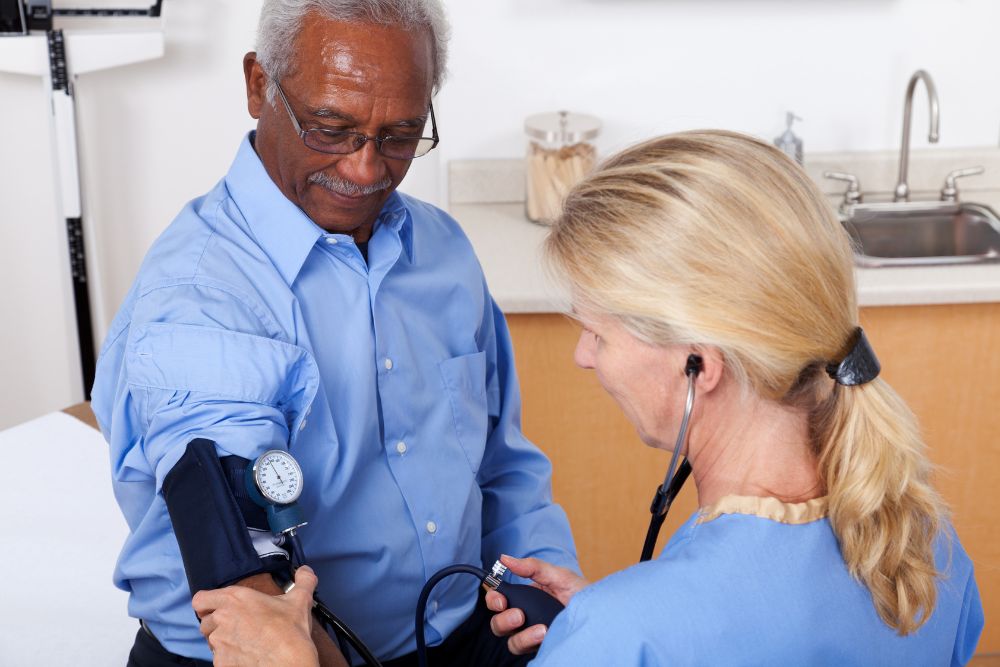How Blood Pressure Can Impact Vision

Among the healthy habits you should practice, blood pressure management ranks pretty high. High blood pressure (or hypertension) is associated with higher risks for various cardiovascular concerns, including heart disease, heart attack, and stroke. If untreated, it can harm other vital organs, including the brain, kidneys, and eyes. Blood pressure actually plays a large role in vision health, regardless of gender or age.
While hypertension itself doesn’t cause vision-related conditions, it’s considered a major risk factor. High blood pressure is dangerous because it can target your retina, the layer of tissue in the back of the eye. The retina converts light and images into nerve signals sent to the brain. But to work properly, it needs a continuous blood and oxygen supply.
Consistent, long-term high blood pressure can cause a condition called hypertensive retinopathy. The retinal wall’s tiny blood vessels thicken and narrow, which may reduce retinal blood flow, blurred vision, and even complete vision loss. Symptoms may include reduced vision, eye swelling, bursting blood vessels, and double vision with headaches. While there’s no cure for hypertensive retinopathy, you can treat it by managing your blood pressure.
Other Retinal Conditions Impacted by Blood Pressure
Diabetic Retinopathy – Like hypertensive retinopathy, this condition can damage retinal blood vessels. However, diabetic retinopathy is caused by high blood sugar. If you have hypertension, along with any type of diabetes, you have a higher risk. With diabetic retinopathy, the eye can grow new blood vessels to replace the damaged ones, but they don’t work as well, causing leaking or bleeding. Early on, there may be no symptoms, or you may notice only occasional vision changes.
We recommend that older adults with diabetes and high blood pressure get a comprehensive dilated eye exam at least once a year. Again, proper blood pressure management is essential; adults with diabetes should aim for a blood pressure of less than 130/80 mm Hg.
Age-Related Macular Degeneration (AMD) – This degenerative disease specifically targets the macula, the retinal component controlling sharp, central vision. Complete blindness usually doesn’t occur, but AMD can lead to central vision loss, making it hard to see faces, or do close-up work. Both AMD and hypertension increase with age. Just as with diabetic retinopathy, older adults with high blood pressure may experience a higher degree of severe AMD.
Retinal Vein Occlusions (RVO) and Retinal Artery Occlusions (RAO) – High blood pressure is a risk factor for this type of condition, especially among older patients. It develops when the central retinal vein and the central retinal artery become blocked or closed off. There are various types of retinal occlusions:
- Branch retinal vein occlusion (BRVO) involves blockages in one or more of the central retinal vein branches. While there may be no symptoms, you may develop floaters, peripheral vision loss, and distorted or blurry central vision.
- Central retinal vein occlusion (CRVO) involves blockages in the central retinal vein. Non-ischemic CRVO (the more mild form) may cause mild blurriness, leaky retinal vessels, and swelling. With ischemic CRVO, the more severe form, vision worsens.
- Branch retinal artery occlusion (BRAO) involves blockages in the central retinal artery. There may be sudden painless peripheral vision loss, blurred vision, or scotomas (blind spots).
- Central retinal artery occlusion (CRAO, or eye stroke) involves blockages in the central retinal artery, and possibly the neck’s carotid artery. CRAOs may prevent retinal blood flow, and there could be severe vision loss.
If you have high blood pressure and experience any changes to your vision, it’s important that you schedule an appointment with an ophthalmologist as soon as possible. Some of these conditions, including CRAOs and CRVOs, are considered to be medical emergencies. The sooner you get treatment, the more likely you are to preserve your vision.
Do you have high blood pressure and suspect a retinal condition or are you already living with one? If so, we invite you to schedule an appointment with Vitreoretinal Consultants of NY today.


